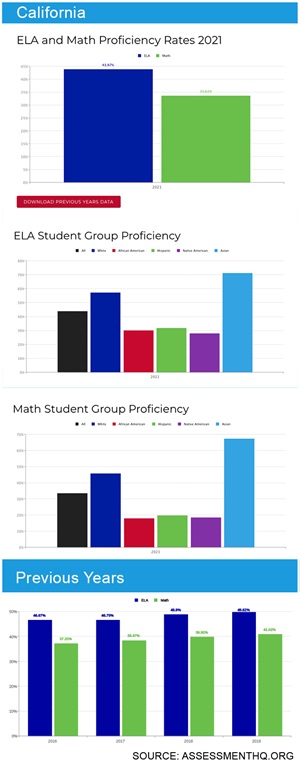Learning Loss
Most States' 2020-21 Assessment Scores Added to Assessment HQ Website, Illustrating Pandemic's Impact on Proficiencies
- By Kristal Kuykendall
- 03/24/22
The Collaborative for Student Success has updated its AssessmentHQ.org site with state assessment data from across the United States reflecting proficiency levels during the 2020-2021 school year along with the previous four years, illustrating in one place the impact of pandemic disruptions to student learning nationwide.
The advocacy nonprofit said in a news release that the benchmark scores in math and English language arts are important to help policymakers and educators understand the range of so-called learning losses resulting from COVID-19 closure of schools and target their recovery efforts accordingly.
“There is a great need to assess areas of strength and need in our education systems – especially as families, schools and students are coping with learning challenges and loss as a result of the pandemic,” said Jim Cowen, executive director of the Collaborative for Student Success. “Assessment data displayed as part of the Assessment HQ update allows schools, educators, and administrators to be honest with students and parents about achievement and what the education needs are for students to be successful and competitive in college, careers, and life. Sadly, an alarming number of students are not performing at a proficient level across the country, and we must do better.”
 States’ participation in assessment testing varied widely during the pandemic. The updated Assessment HQ site includes information on each state’s average scores — and whether a state has declined to disclose its pandemic testing participation or results.
States’ participation in assessment testing varied widely during the pandemic. The updated Assessment HQ site includes information on each state’s average scores — and whether a state has declined to disclose its pandemic testing participation or results.
Assessment HQ’s data came from public information posted on state education agency sites, according to the news release; most states have published scores at some level from the 2020-21 school year, said the Collaborative for Student Success. However, only about a dozen states have released all the assessment data that was typically made available before the pandemic, such as student proficiency rates in each grade as well as across student groups.
Exceptions noted by the nonprofit were Washington, D.C., New Mexico, and Maine have declined to release 2020-21 scores, CSS said. Several states, including Maryland and New Jersey, delayed their 2020-21 testing until last fall, so scores had not yet been made available.
“While annual assessments can always be improved, they are one of the best tools we have to provide an honest check on states to ensure that the decisions and policies impacting young people are grounded in evidence and real results,” CSS said. “They are particularly important for those students who are most vulnerable or who historically have been underserved. Not only do assessments help level the playing field, but they also help ensure that schools are preparing students for college or career.”
Learn more about the collaborative at ForStudentSuccess.org.
About the Author
Kristal Kuykendall is editor, 1105 Media Education Group. She can
be reached at [email protected].